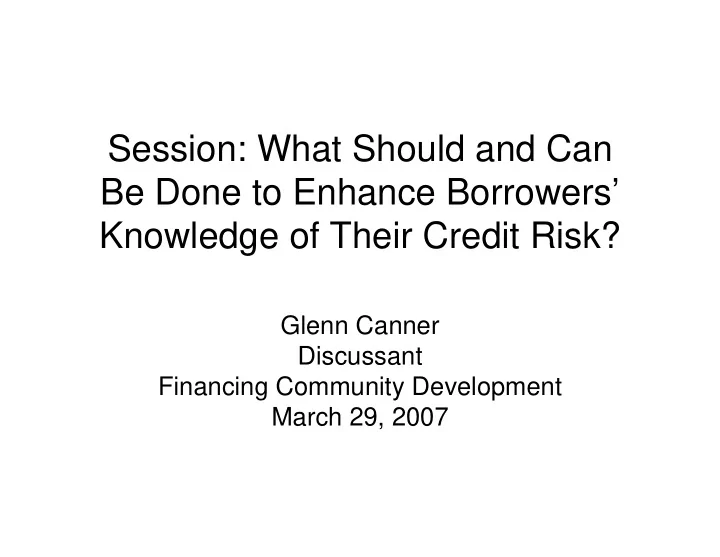

Session: What Should and Can Be Done to Enhance Borrowers’ Knowledge of Their Credit Risk? Glenn Canner Discussant Financing Community Development March 29, 2007
Comments on Targeting Foreclosure Interventions – Paper investigates leading indicators of neighborhood foreclosure sales. • Important topic as elevated rates of foreclosure can have adverse effects on individuals and neighborhood circumstances • Focuses on credit-related and socio-demographic indicators of foreclosure at the census tract level – Analysis finds foreclosures rates are elevated in census tracts with larger rates of: • Individuals with low credit history scores; younger individuals and minority homeownership
Foreclosure Rates are Rising • Concerns about foreclosure have increased as: – Credit quality of borrower pool has widened over time – More mortgages imbed the potential for payment shock – Short-term interest rates have increased – Many borrowers have previously extracted home equity reducing ability to refinance – Home price changes have flattened or fallen – Credit standards are tightening
Theoretical Foundation of Default and Foreclosure • Analysis could be bolstered by establishing a theoretical framework for foreclosure: – Trigger-events theory : events that disrupt ability or willingness to pay: job loss, medical incident, death or divorce – Options theory : default is a put option on the property where the borrower chooses to default when the mortgage balance exceeds the value of the home – This theoretical framework provides a guidepost for factors to consider in an empirical assessment
What Option Theory Might Suggest • Option theory focuses on collateral values and ruthless exercise of “put option” – Change in neighborhood home values: • Areas with low or negative rates of home price appreciation • Areas with elevated rates of nonowner-occupied housing (ruthless financial decision-makers) • High share of FHA loans (little initial equity)
What Trigger-Event Theory Might Suggest • Trigger-event theory suggests focus on factors that disrupt income or create unexpected expenses • Additional metrics by census tract: • Focus on credit scores of mortgage borrowers • Supplement distribution of scores with the proportion of unscorable population • Credit score migration • Shares of higher-priced loans • Ratio of loan amount to income • Census tract unemployment and vacancy rates
Additional Foreclosure Predictors • Additional factors; how they relate to neighborhood foreclosure rate: – Change in median home values 1990-2000— Negative – Percent of mortgage borrowers with low credit scores—Positive – Percent of unscorable individuals—Positive – Percent of loans to nonowner-occupants—Positive – High-priced share—Positive – Census tract unemployment rate—Positive – Census tract vacancy rate—Not significant – FHA share—Not significant – Loan amount-to-income ratio—Not significant
Comments on “Consumer Credit Literacy: What Price Perception?” • Paper investigates consumers’ self-assessment of their credit and the potential effects of inaccurate assessment on financial outcomes. • Analysis compares self-assessment of credit quality with an objective measure of credit worthiness (FICO score). • Analysis finds many consumers have inaccurate self- assessments, particularly those with low credit scores.
Factors Effecting Self-Assessment • Level and expected income, wealth, debts, job stability and prospects, health, etc. • Financial literacy and education; experience in obtaining credit; unsolicited credit applications • Perception of reasons why problems arose (isolated event, type of missed payment—(credit or bills) • Failure to recognize the importance of an adverse event or weight it properly • An individual’s credit scores differ across the three CRAs • Credit score migration over time • Credit score/loan performance relationship
Credit Score Migration (June 2003–December 2004) Change in Credit Score Points Credit Score Decreased Little Increased 25 or more change 25 or more Low 18 40 42 Middle 33 24 43 High 27 50 23
Performance on New or Existing Credit Accounts
Recommend
More recommend